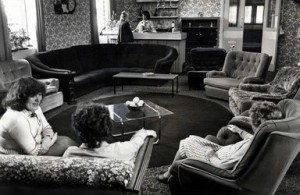In the fourth instalment of our Ely Hospital series, Clare Hutchinson finds out about the often-strained relationships between the hospital’s institutionalised patients and their families back home
From the time it opened as a Poor Law institution for orphaned children in 1862, Ely Hospital was a destination for people who had no families to care for them.
In some cases, this was because members of their close family had died – but in others the reason was altogether darker.
In the late 1940s a 15-year-old girl was admitted to the hospital because she was pregnant and unmarried. After having her baby there, which went on to be adopted, the girl stayed on.
When the hospital closed more than half a century later in 1997, the girl – now a pensioner – was one of the first patients to be resettled in the surrounding community.
One former staff member who remembered the woman, who has not been named in order to protect her identity, said: “She didn’t have a learning disability when she went in, but she left the hospital diagnosed with having one.”
In some cases patients were sent to the institution, which became a long-stay NHS hospital in 1948, because their parents simply could not cope.
For some, this was due to the financial strain of having another child, while for others it was because they were suffering from their own mental health issues, such as depression.
One former resident, interviewed for the Ely Hospital project, said: “My mother put me there, but she’s dead. She was depressed and she took her life, so she didn’t come to see me. Nor my dad. I’ve just got a sister.”
A nurse who worked at the hospital’s children’s ward said many of the residents did not have families.
“There was one particular one, he was the son of the local baker,” she said.
“The baker had died and the mother couldn’t really cope and so he was in the home.
“I wrote to his mother when he died and I had this lovely letter back. She said what a happy life he’d had in the hospital and how kind particular staff had been to him.”
A former therapist who was recruited to the hospital as part of changes that came about as a result of the 1969 Ely Inquiry said many families effectively turned their backs on patients who had been admitted to the hospital.
Others, he said, visited regularly and got involved in activities on the wards.
He said: “Probably families needed support and help to make better relationships with their sons and their daughters.
“That’s something [at Ely] that wasn’t really looked at and which I think needed looking at.”
When families did visit, they were confronted with some shocking sights.
Labour AM for Cardiff West and Cardiff University professor Mark Drakeford is an expert on the Ely Inquiry.
“One of the most striking stories in the report was that of a mother who used to visit her son regularly and always took him a pear,” he said.
“She tells the inquiry about a time she turned up to see him to find all of his teeth had been removed, which was not an unusual thing at the time, so she had this pear and her son had no teeth to eat it with.
“She called the nurse over, who went into a room, came back with a bowl full of dentures and proceeded to try them out one by one – all the time with the mother getting more and more upset.
“When she got through the bowl and none of them had fit, she took the bowl away and as she walked past one of the patients, who was sleeping, she – in full view – whipped the teeth out of his mouth and came back with them.
“When the patient’s mother got upset she was reassured by the nurse, who said, ‘There’s no need to get upset – most of these teeth belonged to patients who are dead anyway.’”
Tomorrow: We look at some of the shocking stories of staff abuse – and talk to former workers about their experiences at the hospital.
